The Center for Social Organization of Schools was established in 1966 as an educational research and development center at Johns Hopkins University, and has been a part of the Johns Hopkins School of Education since 2009.
CSOS combines programmatic research findings from an interdisciplinary team of sociologists, psychologists, policy analysts, and educators, with the development of practitioner-validated strategies, materials, tools, and curricula, plus a wide range of dissemination and training strategies, to support school improvement and student outcomes across the nation.
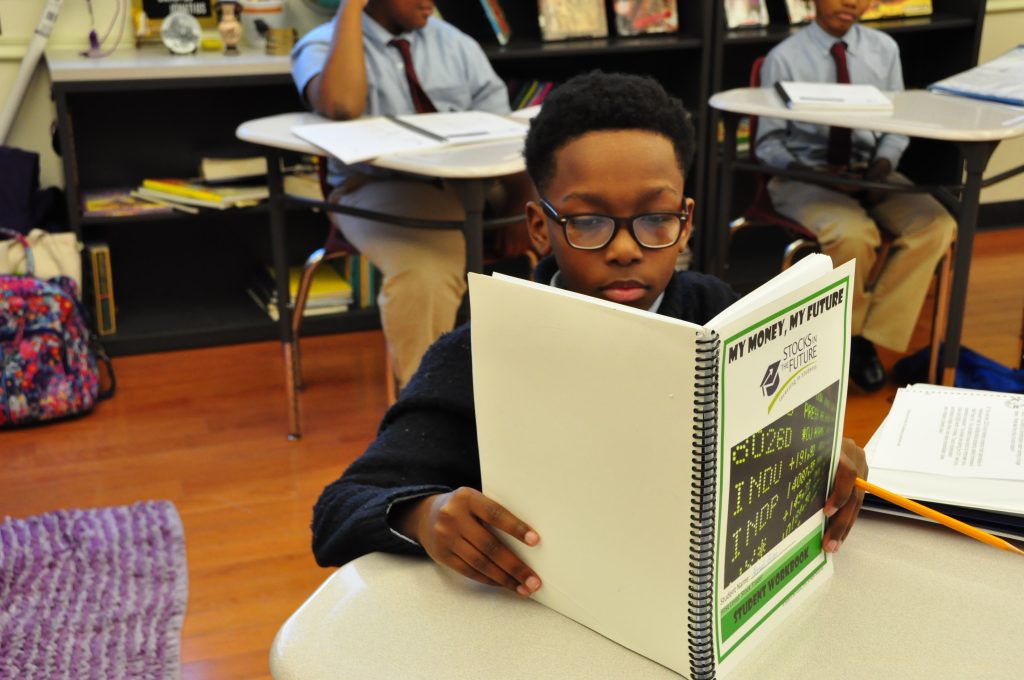
Celebrating 55+ Year
To honor CSOS history and to frame its future, we celebrated CSOS at 50 in 2016 with a series of blog posts throughout the year from CSOS faculty: Robert Balfanz, Faith Connolly, Marcy Davis, Rachel Durham, Joyce Epstein, Jeffrey Grigg, Richard Lofton, Douglas Mac Iver, Martha Mac Iver, and Steven Sheldon. In this series, each faculty member looks back, looks around, and looks ahead to discuss how their work links to CSOS history.
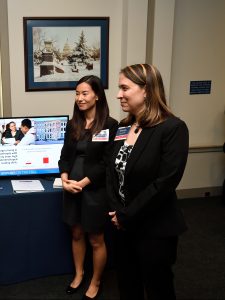
Our History
Founded in 1966 by James S. Coleman and Edward L. McDill under the aegis of the United States Office of Education, the Center for Social Organization of Schools celebrated its 50th year in 2016.
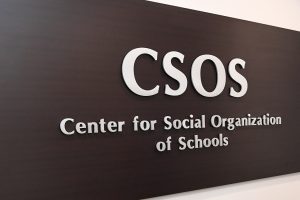

Our History
Founded in 1966 by James S. Coleman and Edward L. McDill under the aegis of the United States Office of Education, the Center for Social Organization of Schools celebrated its 50th year in 2016.

Research Purpose
The purpose of CSOS has remained consistent since its founding — to study how changes in the organization of schools can make them more effective for all students by promoting equity and social justice, academic achievement, well-being, development of potential, and eventual career success.
The emphasis on social organization is based in sound theory — that changes in the structure of an environment will produce changes in the attitudes, behaviors, and accomplishments of the people in that environment. Schools can be made more effective for all students through changes in the organization of the classroom, school, and district. This emphasis compels CSOS to address many major, practical problems in education, including:
How to develop learning environments that minimize students disengagement, and maximize student agency, belonging, connectedness, satisfaction, and learning
How to organize educational experiences that foster learning among students with different interests and needs
How to facilitate the successful transition from education to work, while graduating all students from high school on a path to post-secondary success
How to structure and coordinate educational programs to provide fair access to educational and occupational opportunities
How to connect schools with families and communities in ways that build relationships, promote student success, and enable student, family, and community voice to shape educational opportunities and experiences.
Research Methods
The research methods used in CSOS studies reflect the tasks to be accomplished and the expertise of the research personnel.
Survey research is employed to discover and define relationships between school organizational practices and student outcomes. Experimental research and related methodologies are conducted in school settings. Case studies and qualitative research methods are used to delve deeply into the characteristics of school contexts and the experiences of all participants in education.
Center researchers, educators, and staff work closely with schools, school districts, state departments of education, and the federal government to help implement, create the conditions for effective use, and evaluate the impact of research-based practices and processes.
Research Funding
The substantial research and development accomplishments of CSOS have resulted in its receiving continuing federal funding since its founding in 1966. CSOS has successfully sought grants and contracts from both public and private sources to supplement and extend its mission.
-
Early Learning
Early Learning studies focus on the development and evaluation of early intervention literacy programs, and development of teacher-training modules for early literacy instruction.
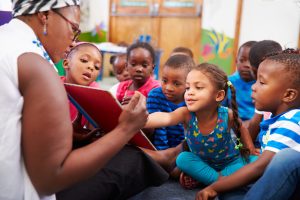
-
Pathways to Success
The Everyone Graduates Center works to develop, establish, and spread evidence-based strategies including middle and high school redesign, student success systems, and pathways to adult success.

-
Partnerships
The Center on School, Family, and Community Partnerships develops, evaluates, and disseminates partnership models that strengthen relationships among educators, family members, and community partners.
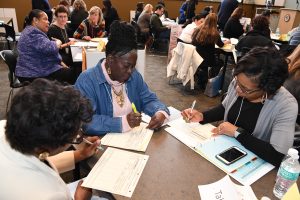
Early Learning
Early Learning studies focus on the development and evaluation of early intervention literacy programs, and development of teacher-training modules for early literacy instruction.

Pathways to Success
The Everyone Graduates Center works to develop, establish, and spread evidence-based strategies including middle and high school redesign, student success systems, and pathways to adult success.

Partnerships
The Center on School, Family, and Community Partnerships develops, evaluates, and disseminates partnership models that strengthen relationships among educators, family members, and community partners.

Center Co-Directors
-
Robert Balfanz, PhD
Professor
Co-Director, Center for Social Organization of SchoolsAffiliation
Center for Social Organization of Schools, SOE Leadership
Expertise
Education Policy & Politics, Research, Evaluation & Assessment, Social Context of Education

-
Marcia Davis, PhD
Associate Professor (Research)
Co-Director, Center for Social Organization of Schools
Director of Research, Baltimore Education Research ConsortiumAffiliation
Center for Social Organization of Schools, SOE Leadership
Expertise
Learning & Instruction, Research, Evaluation & Assessment

-
Steven B. Sheldon, PhD
Associate Professor
Co-Director, Center for Social Organization of Schools
Co-Director, Center on School, Family, and Community PartnershipsAffiliation
Center for Social Organization of Schools, SOE Leadership

Robert Balfanz, PhD
Professor
Co-Director, Center for Social Organization of Schools
Affiliation
Center for Social Organization of Schools, SOE Leadership
Expertise
Education Policy & Politics, Research, Evaluation & Assessment, Social Context of Education

Marcia Davis, PhD
Associate Professor (Research)
Co-Director, Center for Social Organization of Schools
Director of Research, Baltimore Education Research Consortium
Affiliation
Center for Social Organization of Schools, SOE Leadership
Expertise
Learning & Instruction, Research, Evaluation & Assessment

Steven B. Sheldon, PhD
Associate Professor
Co-Director, Center for Social Organization of Schools
Co-Director, Center on School, Family, and Community Partnerships
Affiliation
Center for Social Organization of Schools, SOE Leadership

Researchers and Faculty
-
Joyce L. Epstein, PhD
Professor
Co-Director, Center on School, Family, and Community Partnerships
Co-Director, National Network of Partnership Schools (NNPS)Affiliation
Center for Social Organization of Schools, SOE Leadership
Expertise
Administration, Organization & Leadership, Social Context of Education

-
Tarsha Herelle, PhD
Assistant Research Scientist
Affiliation
Center for Social Organization of Schools
Expertise
Social Context of Education

-
Douglas J. Mac Iver, PhD
Professor
Affiliation
Center for Social Organization of Schools
Expertise
Curriculum Studies, Research, Evaluation & Assessment

-
Martha Abele Mac Iver, PhD
Associate Professor
Associate Dean of ResearchAffiliation
Center for Social Organization of Schools, SOE Leadership
Expertise
Research, Evaluation & Assessment

Joyce L. Epstein, PhD
Professor
Co-Director, Center on School, Family, and Community Partnerships
Co-Director, National Network of Partnership Schools (NNPS)
Affiliation
Center for Social Organization of Schools, SOE Leadership
Expertise
Administration, Organization & Leadership, Social Context of Education

Tarsha Herelle, PhD
Assistant Research Scientist
Affiliation
Center for Social Organization of Schools
Expertise
Social Context of Education

Douglas J. Mac Iver, PhD
Professor
Affiliation
Center for Social Organization of Schools
Expertise
Curriculum Studies, Research, Evaluation & Assessment

Martha Abele Mac Iver, PhD
Associate Professor
Associate Dean of Research
Affiliation
Center for Social Organization of Schools, SOE Leadership
Expertise
Research, Evaluation & Assessment

Researchers and Faculty Continued
-
Barbara A. Wasik, PhD
Professor (Courtesy)
Affiliation
Center for Social Organization of Schools
Expertise
Curriculum Studies
Barbara A. Wasik, PhD
Professor (Courtesy)
Affiliation
Center for Social Organization of Schools
Expertise
Curriculum Studies
Staff and Practitioners
|
|